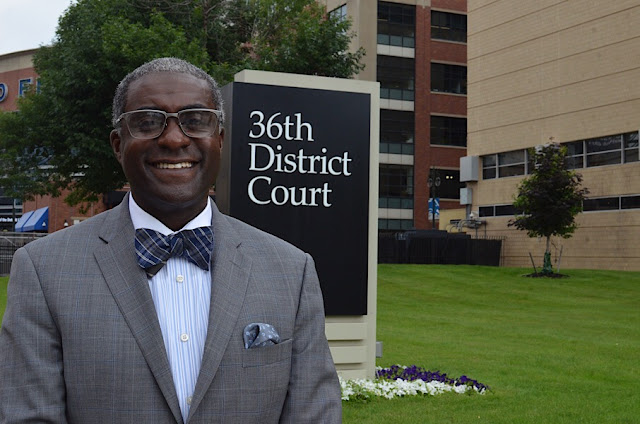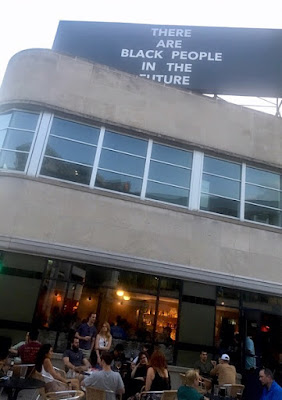IS THIS DETROIT?
Sunday July 21, 2019
A two-part column on observing the trial of my brother Khari Mosley in Detroit
By Tereneh Idia
“There was some sort of altercation, or something,” my father began. “Detroit, I am not sure what happened. Khari and Chelsa, the police were called.”
Hearing police, froze me in my tracks, my breath slowed, my heart raced, as past experiences flashed in my head.
The first time I remember interacting with the police as a child. Khari was around 5. The white police officer called him “Willie” and patted him on the head, like a pet. My mother didn't like it but didn't say anything until after the officer left the house.
“Don’t let anyone call you that.” She said to us in general. “It is a stand-in name for any Black child,” she explained. “They don’t know your name so they just call you Willie. No, don’t let them do that to you.”
But we just did, I thought. My mom didn’t think we could stand up for ourselves and say, No that’s not his name.
I think about all the interactions with security guards and police you have if you’re Black in America. Not because you have done anything wrong but because you are Black in America. One time a white friend of mine joked, “Oh I can do anything in here because the security guard will be watching you the whole time Tereneh, ah ha ha!” So funny right?
I remember the time that Khari was made to lie face down and spread eagle on a basketball court because he “Fit a description.” Or the time I was pulled over because the Pennsylvania State Trooper had “never seen a temporary transport license plate” when I bought a used car in PA and was driving it to New York.
All these things flashed in my mind as my father spoke, I waited, not fully breathing, wanting to know if Khari was alive, if alive - then not hurt, if not hurt then, what? I wanted to say “I hope he is okay.” But I already knew that he couldn’t be okay not really.
The initial media reports were all over the place, hints of a bar altercation and teasings of potential domestic violence - it was all so ridiculous I dismissed them immediately, but I know others soaked it in though - clickty, click, clickbate.
I learned that Khari was not in custody but Chelsa Wagner, his wife was - none of it made any sense but I had hoped to learn what happened.
Khari called me and the more he talked, the more surreal it all seemed. A forgotten key card to a hotel room. A room registered in Chelsa’s name but to two people, who arrived together and were issued two keys. During the trial the manager on duty said “There is policy at 5pm and different policy at 1am.” In terms of helping a guest get to their room if a keycard is lost.
And in the words of one the security guards, “No one [in hotel security] was in charge that night.” Clearly.
So here was Khari trying to figure out how to get back into the hotel, into the hotel room. On a cold Detroit night turning into morning and then snow starts to fall. Unable to call Chelsa because she was asleep and is a hard sleeper.
But early he had let her know he would have one drink at the hotel bar and come up, which he did and charged to the room. She knew he was coming because she had propped the door open so he could get in. But you needed the keycard to get up the elevator in the evening.
He was not even arrested that evening or charged at all, until the day after Khari and Chelsa’s attorneys notified that they would be suing. That timing though!
Once charged, taking a plea was on the table for a moment. But I am not sure how seriously.
Khari was convinced if a jury saw the video they would understand he did nothing wrong. In fact when security said that there are cameras everywhere and the police are coming. Khari said he was glad. Then people could see the truth, then the police could maybe help with the situation. The plea offered - one month probation wasn’t the point, the point was principles.
Khari said that a phone call from our dad helped to solidify his resolve. Our dad, Thaddeus Mosley, recounting all of the times he couldn’t stand up for himself in his 92 years, all the many Black people who couldn’t stand up. Sometimes it is more about the principle. Stand up son.
He did. In the end Khari was found not guilty.
Chelsa and Khari being interviewed outside the courthouse in Detroit
PART 2
DETROIT IN CONTEXT
If you walk from the hotel in question to the 36th District Court you may walk right under a “There Are Black People In the Future” billboard by Alisha Wormsley. The point was not lost of any of us who travelled from Detroit to Pittsburgh. Both rust belt cities in the process of redefining who they are and as this course takes root, so to the whitewashing and gentrification.
What many Black Americans are seeing are cities like Detroit, is the attempt to create a future that does not include Black people.
You see some Black cultural references, a new Stevie Wonder mural or Paradise Valley park, where I met Chris White a police accountability and community activist in Detroit. But where is the actual celebration, power and place-making of Black people? Not references or monuments to what was but what is and will be in the future?
In the case of many businesses in Detroit in much of America, there are different rules based not only on the time of day but different rules based on who you are and the color of your skin.
A white male journalist in Pittsburgh can say, “No one gets arrested for nothing.” Because of his whiteness, that is the skin color privilege he fails to recognize but bets his life on every day, does what he can to maintain and uphold white privilege. Not realizing that we can live in the world where we all just have life privilege.
DETROIT - PITTSBURGH CONNECTIONS
Chris White is the Director of Operations for Detroit Coalition Against Police Brutality. Growing up in Detroit he, like most of his friends, would root for the Steelers if they played again the Cowboys. “Because of our blue collar heritage. You had steel and we had the cars.”
After the first day of trial we met in Paradise Valley parklet, a small area of green that “Commemorates what was,” Chris explains. What it was, a Black community in central Detroit area. “Just like y’all’s Hill [District], that is what happened here, this was Paradise Valley.”
Speaking to Chris is like speaking to an old friend or cousin you haven’t seen for awhile though I had just met him the day before. When he talks about people saying, “Detroit is so much better now, but then they have a limited timeframe, they have limited experience. And better for whom?” Sounds familiar.
He was connected to Khari Mosley’s case because this is “...an injustice that has taken place, I know that had Khari had been white he would not been treated like that at the hotel. It would not had been a question of vagrancy or anything like that...It is a bad look for our city to treat anyone like that..after getting to know Khari, I don’t understand how anyone can treat him that way.”
The demographics of Detroit in Pittsburgh are reversed Detroit is 80% Black while Pittsburgh is 25%. In the words of Chris, “Detroit is demographically Black but cultural confused.” The desire of some Black folks in Detroit to prove that they are worthy stewards of the white supremacist patriarchy to clean up “the clowns” as Khari was called by one of the reporting police officers.
I asked him, What is happening in racial equity and justice as it relates to the police in Detroit?
Chris believes that Detroit is going backward, “I think that people need to understand that the worst form of police brutality is to have a police department that is improperly managed in a place that needs community policing the most....It is taking the city backwards.”
But in Khari’s case, I asked, everyone was Black - the security guards, manager and police officers. Can race still be a negative factor if everyone is Black?
Chris says unequivocally yes. “It is a form of consciousness...not understanding your history...The fight to be on the police force as a Black person had been about fighting for equality...[but now] their ‘job’ is to protect and fulfill the narrative of the whitening of Detroit. Just because they are African-American in color, they are in fact cultural confused and in fact agents of a system of corporate control that is based on white supremacy...Khari has fallen victim, right in the middle of this gentrification and the corporate narrative.”
Is Detroit still a Chocolate City?
“It is Black demographically and culturally confused,” Chris says. “That Black political power...the erosion of public sector, there is an issue of suburbanization...there is somewhat of a brain drain of Blacks...they have taken their individual success and forgot about the collective.”
Or when the prosecutor asked why Khari did not just “behave.” A word an interesting choice to use when speaking of another adult person. She, a white woman, repeated this over and over, clearly not understanding the historic and gentrification-filled power of the word.
Khari is part of the climate where someone who chooses to stand for himself, especially a African-American male...must to be bought down, in such a way as to those who witness it or see it in the media man, will know not even try to conduct themselves that way...There are some that are sick and tired of it. And know a game when it is being ran.
That game was played by the police, by the hotel. Happily the the jury did see through that game. Khari showed it is worth standing up and fighting for yourself.
Especially as a Black man in America.
Khari embraces attorney Charles Longstreet, attorney Kevin Mincey and Chelsa Wagner looks on.








Comments
Post a Comment